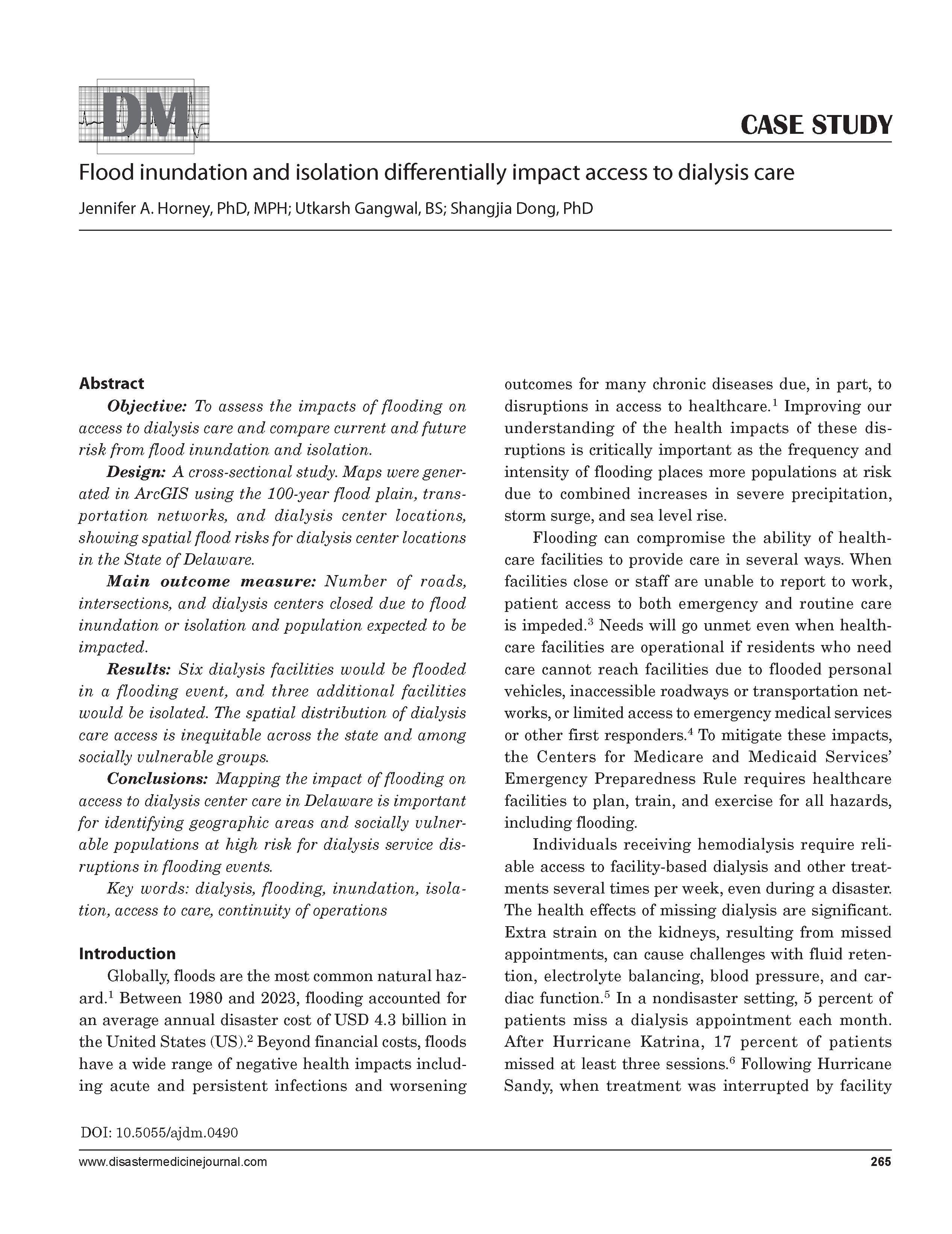Flood inundation and isolation differentially impact access to dialysis care
DOI:
https://doi.org/10.5055/ajdm.0490Keywords:
dialysis, flooding, inundation, isolation, access to care, continuity of operationsAbstract
Objective: To assess the impacts of flooding on access to dialysis care and compare current and future risk from flood inundation and isolation.
Design: A cross-sectional study. Maps were generated in ArcGIS using the 100-year flood plain, transportation networks, and dialysis center locations, showing spatial flood risks for dialysis center locations in the State of Delaware.
Main outcome measure: Number of roads, intersections, and dialysis centers closed due to flood inundation or isolation and population expected to be impacted.
Results: Six dialysis facilities would be flooded in a flooding event, and three additional facilities would be isolated. The spatial distribution of dialysis care access is inequitable across the state and among socially vulnerable groups.
Conclusions: Mapping the impact of flooding on access to dialysis center care in Delaware is important for identifying geographic areas and socially vulnerable populations at high risk for dialysis service disruptions in flooding events.
References
Paterson DL, Wright H, Harris PN: Health risks of flood disasters. Clin Infect Dis. 2018; 67(9): 1450-1454. DOI: https://doi.org/10.1093/cid/ciy227
National Oceanic and Atmospheric Administration: Billion-dollar weather and climate disasters. 2023. Available at https://www.ncei.noaa.gov/access/billions/. Accessed July 5, 2024.
Kopp JB, Ball LK, Cohen A, et al.: Kidney patient care in disasters: Lessons from the hurricanes and earthquake of 2005. Clin J Am Soc Nephrol. 2007; 2(4): 814-824. DOI: https://doi.org/10.2215/CJN.03481006
Arrighi C, Pregnolato M, Dawson RJ, et al.: Preparedness against mobility disruption by floods. Sci Total Environ. 2019; 654: 1010-1022. DOI: https://doi.org/10.1016/j.scitotenv.2018.11.191
National Kidney Foundation: Missing dialysis treatment is dangerous for your health. n.d. Available at https://www.kidney.org/atoz/content/missing-dialysis-treatment-dangerous-your-health. Accessed July 5, 2024.
Andreson AH, Cohen AJ, Kutner NG, et al.: Missed dialysis sessions and hospitalization in hemodialysis patients after Hurricane Katrina. Kid Int. 2009; 75(11): 1202-1208. DOI: https://doi.org/10.1038/ki.2009.5
Kelman J, Finne K, Bogdanov A, et al.: Dialysis care and death following Hurricane Sandy. Am J Kid Dis. 2015; 65(1): 109-115. DOI: https://doi.org/10.1053/j.ajkd.2014.07.005
Blum MF, Feng Y, Anderson GB, et al.: Hurricanes and mortality among patients receiving dialysis. J Am Soc Nephrol. 2022; 33(9): 1757-1766. DOI: https://doi.org/10.1681/ASN.2021111520
Grossman E, Hathaway M, Khan A, et al.: A web-based interactive map to promote health-care facility flood preparedness. Disaster Med Public Health Prep. 2022; 16(3): 895-898. DOI: https://doi.org/10.1017/dmp.2020.482
Kaiser R, Karaye IM, Olokunlade T, et al.: Hemodialysis clinics in flood zones: A case study of Hurricane Harvey. Prehosp Disaster Med. 2021; 36(2): 135-140. DOI: https://doi.org/10.1017/S1049023X21000042
Dong S, Gao X, Mostafavi A, et al.: Modest flooding can trigger catastrophic road network collapse due to compound failure. Commun Earth Environ. 2022; 3(1): 38. DOI: https://doi.org/10.1038/s43247-022-00366-0
Gangwal U, Dong S: Critical facility accessibility rapid failure early-warning detection and redundancy mapping in urban flooding. Reliab Eng Syst Saf. 2022; 224: 108555. DOI: https://doi.org/10.1016/j.ress.2022.108555
Bates PD, Quinn N, Sampson C, et al.: Combined modeling of US fluvial, pluvial, and coastal flood hazard under current and future climates. Water Resour Res. 2021; 57(2): e2020WR028673. DOI: https://doi.org/10.5194/egusphere-egu21-14646
Dong S, Wang H, Mostafavi A, et al.: Robust component: A robustness measure that incorporates access to critical facilities under disruptions. J R Soc Interface. 2019; 16(157): 20190149. DOI: https://doi.org/10.1098/rsif.2019.0149
Delaware Coastal Programs: Preparing for tomorrow’s high tide: Sea level rise vulnerability assessment for the State of Delaware. 2012. Available at http://de.gov/slradaptplan. Accessed July 5, 2024.
National Oceanic and Atmospheric Administration, Office for Coastal Management: New Wetland Park in Delaware solves decades of flooding issues. 2024. Available at https://Coast.noaa.gov/states/stories/southbridge-wetlands.html. Accessed July 5, 2024.
Grabelsky B, Scott MS: Creating flood ready communities: A guide for Delaware local governments. 2016. Available at https://www.completecommunitiesde.org/flood-ready/. Accessed July 5, 2024.
Kirkpatrick Q: New project will help combat flooding at bowers beach. 2022. Available at https://www.delawarepublic.org/delawareheadlines/2022-03-30/new-project-will-help-combat-flooding-atbowers-beach. Accessed July 5, 2024.
Sever L, Pehlivan G, Canpolat N, et al.: Management of pediatric dialysis and kidney transplant patients after natural or man-made disasters. Pediatr Nephrol. 2023; 38(2): 315-325. DOI: https://doi.org/10.1007/s00467-022-05734-8

Published
How to Cite
Issue
Section
License
Copyright 2007-2025, Weston Medical Publishing, LLC and American Journal of Disaster Medicine. All Rights Reserved.

